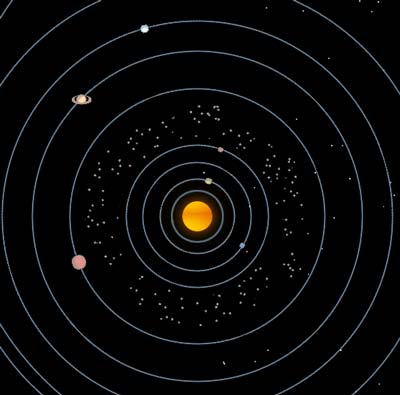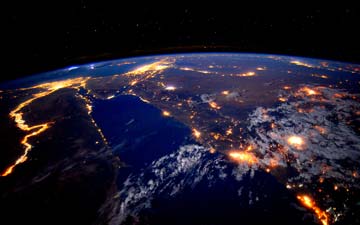Ask the Astronomer
From Ken Voska, a science teacher at Keio Academy of New
York:
I have heard that perhaps the most dangerous form of cosmic event for life on
Earth would be a supernova explosion within our vicinity. This danger was described
to me as more severe than an asteroid impact.
Astronomer William Georgevich replies:
Ken, you're absolutely correct for 3 reasons:
1) With an asteroid, comet, or planetoid, there is the possibility with our frequent space shuttles to send one to the aforementioned object and give it a gentle shove thereby changes its Earth-impact trajectory to a harmless Sun-impact trajectory where the object simply is absorbed by our own Sun. No such luck with a supernova. A supernova is when a star implodes/explodes after burning up most of its nuclear fuel. There is nothing anyone on Earth can do about this. Even if we could leave the Earth, we would have to have a starship that could travel as fast or faster than the speed of light to outrun the shockwave.
2) A supernova is such a large cosmic event that when astronomers view supernovae in other galaxies, that exploding star sometime shines for several days with the brightness of 10 billion suns. The amount of energy released is equal to a small Big-Bang. Not only would any planet nearby be instantly vaporized, but asteroids, nebulae, and even other stars could be seriously compromised or vanish altogether. A supernova is the single most catastrophic event in the entire Universe.
3) Interestingly supernovae are also the seed bearers of planets and life as we know it. All the heavier elements of the Universe are formed during supernovae explosions. So we have a real paradox here. Anything near such an exploding star would be instant toast. On the other hand the heavy elements necessary for planets and life on planets would be left in the cooling debris field!
Ken Voska replies:
Thanks for the answer to my question about the danger of a nearby supernova explosion. However, I would still like to know if there are any statistics on the possibility of such an explosion close enough to Earth to do damage. Are there any potential supernovas near by ? What and where is the closest potential supernova ? Do astronomer calculate data for supernova probabilities like "100 year floods" or possibilities of an earthquake registering 8 on the Richter scale?
William Georgevich:
Unfortunately, there is absolutely no way of knowing when a star will supernova, except to say that it occurs at the end of a star's multi-billion year lifetime. We're simply not close enough to any star and don't have an accurate enough model of stellar evolution to predict with any certainty exactly when this will happen.
Any star within 25 light years of the Earth (150,000,000,000,000 miles) would certainly vaporize the Earth and the Solar System into a meaningless cloud of dust should it supernovae. This means that stars like Sirius, the brightest star in the sky, and Vega, the North Star in 13,000 years, are potentially within striking distance. Fortunately, neither of these stars are suppressants and thus are not good candidates for a supernova explosion because they are not massive enough.
 See an animation of the movement of planets in our solar system.
See an animation of the movement of planets in our solar system. See amazing views from space
See amazing views from space